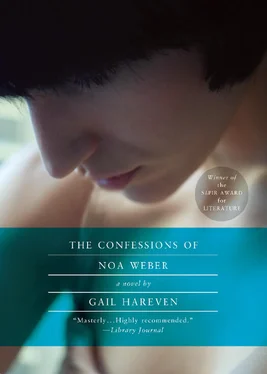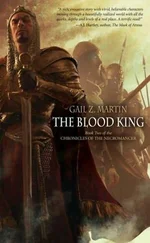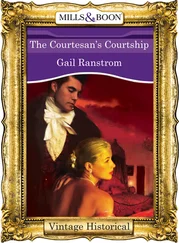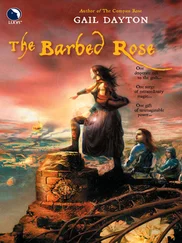“Good material for the KGB …,” Alek said once, when he picked up one of the illustrated publications of the Agricultural Development Company lying next to my bed. Hagar had scribbled a red beard and mustache on the face of the scientist in the photograph and made red flowers bloom from his test tube. “You want to pass it on to them?” I asked. “What? To whom?” he said, in alarm or revulsion. As far as I was concerned he could have been a spy, I didn’t care whom for. I was ready to be his agent, his field worker, taking his questions and presenting them to my father — Alek wouldn’t fuck me until I brought him the answers — I was ready to mingle with my parents’ friends, to question them and get the required information out of them, to blow the whole rotten system up from the inside.
But Alek said: “It isn’t funny. KGB and its informers, Noia, it isn’t funny.” “Informer” was apparently the worst word in his lexicon, and once we had a nasty argument about it, when in the wake of ideas we were tossing around in the fund I mentioned to him a proposal for a sweeping law making it mandatory to report the abuse of minors, women, and the elderly. “Someone who does something like that, who abuses defenseless people, has no rights and should be shot. I would shoot him myself. But to inform, and even to make this law, that is something else.” “You’re an anarchist,” I said, as if a minute before I hadn’t had fantasies of blowing the system up from inside. “I am not an anarchist. You know what? Okay, I am. Better to be an anarchist and to shoot, than for neighbors to start informing on each other.”
But this isn’t what I wanted to talk about now. I was living with injustice, cruelty, stupidity, and sadism, with this cocktail of the social system, and with the fact that my heart was hardly ever crushed like the other Noa’s. The anger got through to me, and I was good and angry with whomever and whatever I needed to be, but I couldn’t feel the pain of the victims.
For a considerable part of the time however I did succeed in attaining one thing, and I sought it more and more: the awareness that in this world I and my entire range of feelings were not of the slightest importance, because touching heaven didn’t change anything in the real world.
I went on meeting Alek whenever it suited him, he still pushed me to the edge and he still unraveled my heart and sharpened my edges, but in another separate part of my brain I grew indifferent. Not to him, no, never to him, but to myself and to what was happening to me.
One minute I was with him with the blinds closed, with take me, take me already, ready to fall to his feet as long as he took me, and half an hour later with the Association of the Victims of.… Or the Committee for the War against.… Switching off my face and saying: “Let’s hear how you define your aims,” saying: “We’ll take it up with the board of directors,” saying: “But the most important thing is for you to start showing independence.” Sometimes I would lay my hand on my skirt, under the table, press a fingerprint left on my thigh to see if I could produce a pain, try to deepen the mark; the desire didn’t diminish, but gradually it began to seem worthless.
The heavens could open to me, divinities could manifest themselves to me, my soul could fly out of my abandoned illuminated body, and all this would not change anything in the intermittently disembodied but nevertheless villainous world in which I moved.
HAGAR
I said that the work didn’t get to me like it did to others, but in the end I think it may have had an effect on Hagar. I don’t mean only that it took up all my time, and that I kept on sending her at the last minute to my mother, to Miriam, to girlfriends; I mean mainly that all the great injustices we dealt with at the fund somehow dwarfed her childhood, which suffered from an excessive sense of proportion. When her mother is going to visit a shelter for battered women or to meet the representatives of an organization for the disabled, a wise daughter — and Hagar was always wise — will not complain about the fact that it is her grandmother who accompanies her to the end-of-the-year party. As compensation, I would talk to her a lot about my work, tell her where I had been, who I had met and what I had done, and she was always interested. Sometimes more than in what was happening at school or in the youth movement.
During school vacations she spent quite a lot of time in the office, where she always asked for explanations about what we were doing, and there was always someone who offered to explain. At the age of nine she inhaled tear gas at the demonstration outside the Prime Minister’s house in the wake of the massacre of Palestinian refugees in the Sabra and Shatila camps in Lebanon. At the age of sixteen she was spat upon on Paris Square at the Women in Black vigil against the occupation.
If today my daughter sometimes looks to me as if she is made entirely out of ideas and principles, I have only myself to blame.
If I hadn’t met my soul, if not for Alek, perhaps I would have been just like her.
Me: Hello, darling, how are you? What was it like with your father?
Hagar: All right.
Me (carefully, as if absentmindedly, looking for something in my blazer pocket): All right — how?
Hagar: Just all right. But I don’t like date ice cream any more, and anyway it’s not healthy to eat ice cream in winter.
Me: Why don’t you tell him?
Hagar: Next time he comes it may be summer already, and maybe I’ll like the taste again.
In the spring of ’88 Alek arrived for a short, bad, two-week visit, accompanying a television crew which was preparing a film about women in the Intifada, and he took a room apart from the crew in the Hotel Petra next to the Jaffa Gate. “I’ve wanted for a long time to wake up in the morning in the Old City.” Hagar, who was almost fifteen and very active, accepted his invitation to meet him at the YMCA, and came back to me with the angry conclusion that, “That man is a right-winger, a male chauvinist, and a racist.”
“Now that I’ve met him,” she said to Tami who was in a huddle with me in the kitchen, “now I’m really beginning to understand why my mother can’t stand men.”
Alek to the best of my judgment is not right-wing, chauvinistic, or racist, but there is no doubt that he succeeded in infuriating her with the question: “Is it permitted to tell a feminist girl how pretty she is?” with his tasteless remark about “shots of a Palestinian yingeleh,” and who knows what else. My little feminist, by the way, was not exactly pretty at that period in her life. Adolescence made her clumsy, her body looked embarrassed, and it was only in the summer before going to the army that she recovered her grace. In any event, I imagine that he was trying in his way to flatter her. I couldn’t tell her that her father, too, thought that we were waging a war of Goliath against David, that personal liberty was more important to him than anything else, far more important than national liberation — either ours or the Palestinians’—and that he detested propaganda of any sort; in doing so, I would be giving myself away. And in any case it was clear that the two of them rubbed each other the wrong way: she made inflated declarations, and he deflated them. He could have, should have, restrained himself, but in the end perhaps it was for the best, and when she went to visit him in Paris both of them were already careful to avoid provoking arguments.
Alek is not a father to Hagar, and he is a bad father to Mark and Daniel, the sons of the woman whose children he wanted to sire from the moment he set eyes on her. If Hagar needed something big, for him to bring her the golden-hearted flower, to pluck the moon from the sky for her, I have no doubt that he would do everything in his power and beyond it, that he would turn the world upside down for her sake, and the same goes for his sons, but the daily business of fatherhood is something beyond his comprehension or his capacities. And in any case, it seems that his women and children get along very well without him.
Читать дальше












